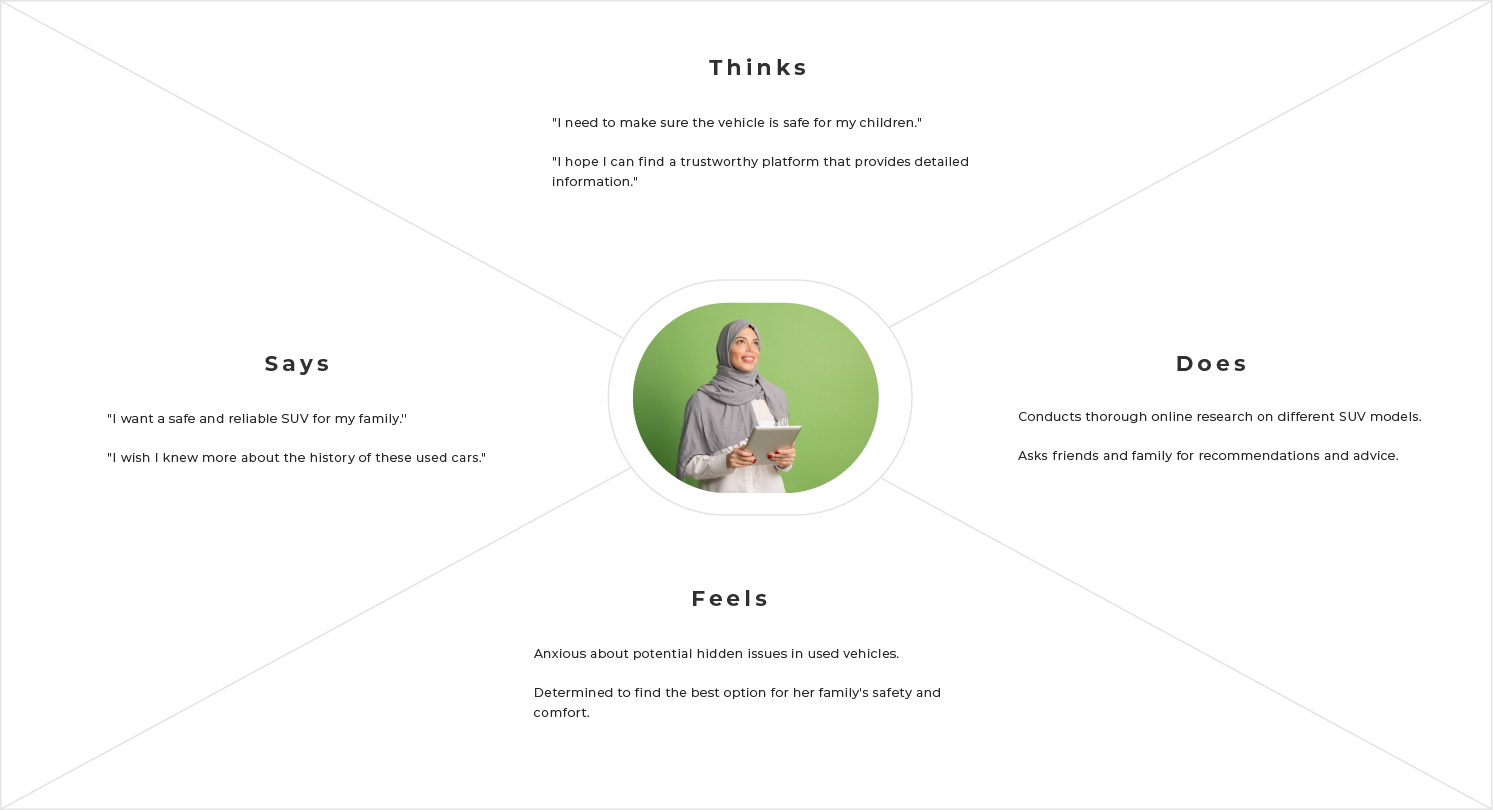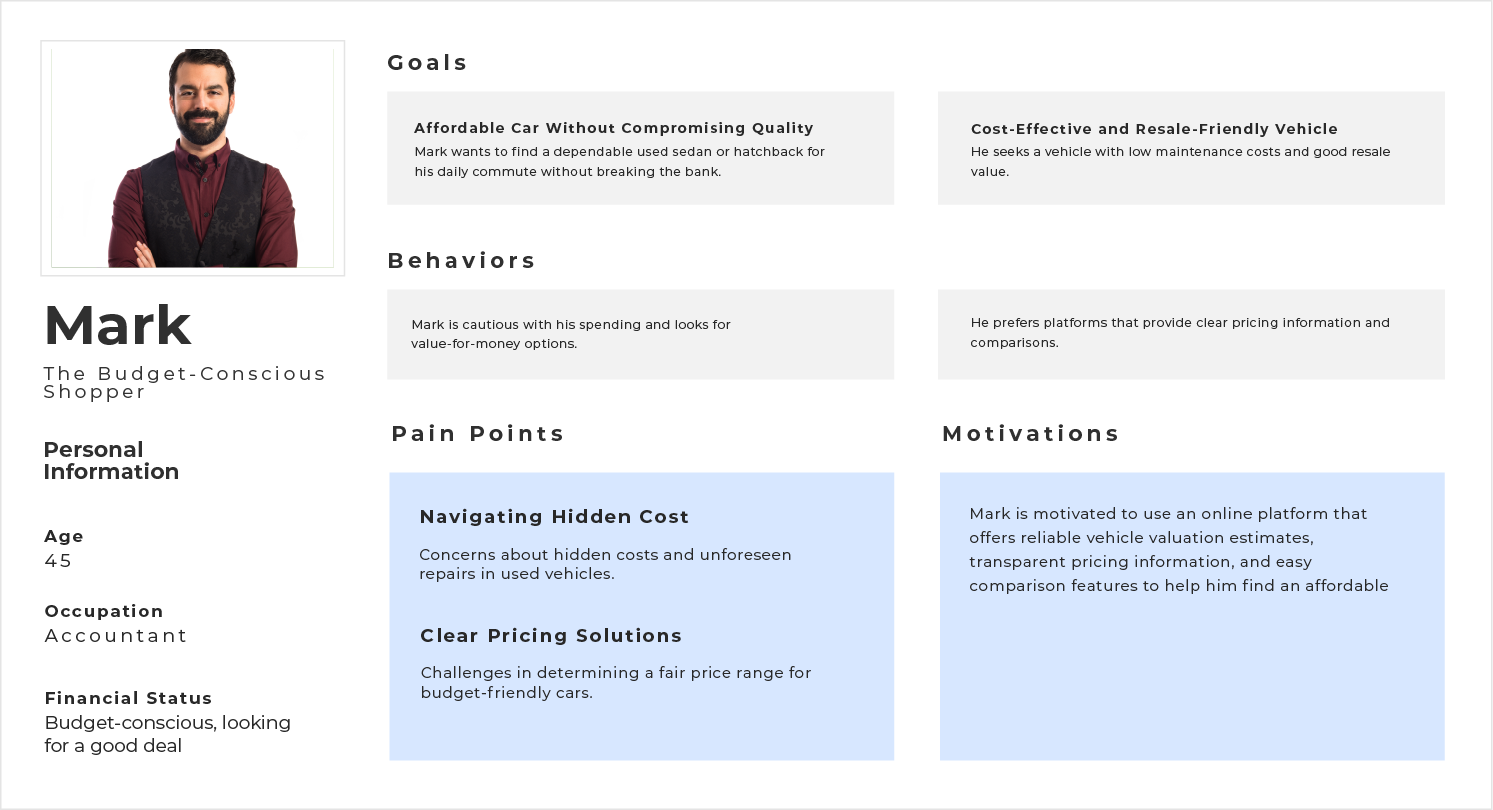Vehicle Report is an online platform, dedicated to improving the used car buying journey. It offers reliable vehicle history reports precise valuation estimates, and an intuitive comparison feature to enable well-informed decisions.

Empowering used car buyers in making informed decisions and negotiating better prices




Client
Duration and outcome
5 Months 35 Screens
My role
- Senior Product Designer
I led the design efforts for the website’s user experience (UX). This involved conducting user research, competitive analysis, user interviews, persona design, flow design, creating wireframes and prototypes, designing visually appealing interfaces, usability testing, and collaborating with cross-functional teams.
Tools used
Introduction
Buying a used car can be a daunting experience, fraught with uncertainty and risk. It’s a significant investment of both time and money, and the fear of ending up with a lemon— a car that’s far from what it seems— is a common concern. From hidden mechanical issues to undisclosed accident histories, the potential pitfalls of purchasing a bad car loom large. In this context, ensuring a reliable and trustworthy purchase becomes paramount.
Recognizing the daunting challenge faced by consumers in the used car market, Automata ME, a prominent automotive company in the UAE, identified the pressing need for a solution. With a deep understanding of the complexities and uncertainties involved in purchasing a pre-owned vehicle, Automata ME embarked on a mission to create a reliable and innovative solution to empower consumers and enhance their car buying experience.
The process
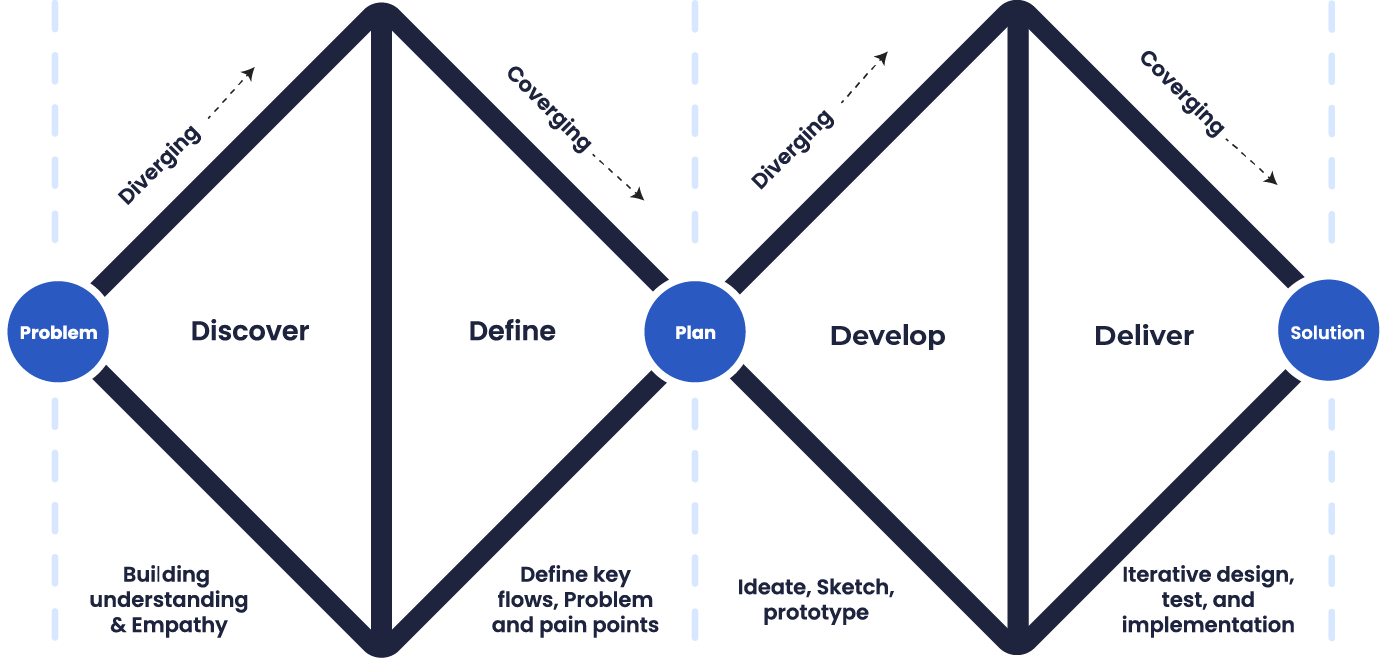
Discover Phase
Building understanding and empathy. During the discovery phase, we conducted extensive research to gain insights into the needs, pain points, and behaviors of our target users.
01
3
25
150
Competitive Analysis
I began my search with a competitive analysis to understand the current landscape of vehicle report platforms, what competitors offer, and their strengths and weaknesses. The goal was to grasp existing platforms providing vehicle history reports. By assessing competitors’ strengths, weaknesses, and opportunities, I was able to pinpoint market gaps and effectively differentiate our Vehicle Report Website.
This foundational understanding guides our further research efforts and steers the project’s direction.

User Interviews
Once the project team had a solid understanding of the competitive landscape, we were able to proceed with conducting user interviews. User interviews provide qualitative insights directly from potential users of the Vehicle Report platform.
These insights can help validate assumptions, uncover user needs, pain points, and behaviors, and provide context for the development of user personas. User interviews also allow for deeper exploration of specific topics that may not be covered in a survey.
We interviewed individuals who were in the process of buying a used car or had recently purchased one. We aimed to understand their challenges, preferences, and expectations when it comes to accessing information about used vehicles.
”Can you tell us about your experience with buying a used car?
Experience and Preferences
”What factors do you consider most important when purchasing a pre-owned vehicle?
Experience and Preferences
”Can you describe a memorable experience you've had when purchasing a used car, either positive or negative?
Experience and Preferences
”What do you like or dislike about the current methods or platforms available for accessing vehicle history reports?
Experience and Preferences
”How do you typically research or gather information about a used car before making a purchase?
Information Gathering
”What sources do you trust when looking for information about a vehicle's history, such as accidents or maintenance records?
Information Gathering
“Are there any specific concerns or uncertainties that you have when buying a used car?”
Information Gathering
“Can you walk us through the steps you take when deciding whether to buy a specific used car?”
Decision Making Process
“What role does access to comprehensive vehicle history information play in your decision-making process?”
Decision Making Process
“If you could change one thing about the process of buying a used car, what would it be?”
Feedback and Suggestions
“What features or functionalities do you wish were available in existing solutions for accessing vehicle history reports?”
Feedback and Suggestions
“How do you think a platform like ours could improve the experience of buying a used car?”
Feedback and Suggestions
“Is there anything else you would like to share with us about your experiences or needs when buying a used car?”
Additional Information
User Surveys
After conducting user interviews, I distributed a survey to collect quantitative data on user preferences, priorities, and pain points regarding purchasing used cars online.
A survey offers a broader quantitative perspective by reaching a larger user sample. It validated interview findings, quantified the prevalence of issues and preferences, and identified trends across a wider audience.


Why this Sequence?
Conducting a competitive analysis first provides a foundational understanding of the market landscape and helps shape subsequent research efforts. User interviews are then conducted to gain qualitative insights directly from potential users, providing deeper context and understanding of user needs and behaviors. Finally, surveys can be used to gather broader quantitative data to validate findings from user interviews and identify trends across a larger sample size.
This sequential approach ensures that research efforts are informed by an understanding of both the competitive landscape and user needs, allowing for more targeted and effective design and development of the Vehicle Report platform. Additionally, it helps prioritize research efforts based on the most critical and relevant information needed at each stage of the project.
Define Phase
The Define phase focuses on distilling research insights into a clear problem statement, user personas, design principles, and specific user requirements. This phase sets the stage for developing a solution that directly addresses the identified user needs and pain points.
02
Synthesis
Research findings
What insights have we gained? By integrating survey findings, user interviews, and competitive analysis outcomes
Creating User Personas & Empathy Maps
We develop distinct user personas to represent the primary target audience based on our research insights. Each persona includes key details such as demographic information, goals, behaviors, challenges, and motivations. These personas help us better understand and cater to the needs of our users during the design and development process.
Problem Statement
Many consumers purchasing used vehicles face significant uncertainty due to the lack of transparent and reliable information about vehicle history, condition, and fair market valuation. This leads to hesitation and uninformed decision-making during the car-buying process. Vehicle Report aims to address this problem by providing comprehensive vehicle history reports, accurate valuation estimates, and intuitive comparison features, empowering users to make well-informed and confident purchasing decisions.
Defining User Requirements
Designed the User requirements from the identified user needs, pain points, and desired outcomes. These requirements define the specific functionalities and features that the platform must incorporate to address user needs effectively. Here are detailed user requirements for the Vehicle Report platform:
| Requirement | Description |
|---|---|
1Comprehensive Vehicle History Reports |
|
2Accurate Valuation Estimates |
|
3Intuitive Comparison Features |
|
4User-Friendly Interface |
|
5Trustworthy Information Sourcing |
|
6Performance and Scalability |
|
7Customer Support and Feedback |
|
User flow
Created a user flow to map out the sequence of steps and interactions that a user will take to access and utilize the report system.

Develop Phase
Ideate, Sketch and prototype
03
Wireframes
I developed wireframes to define the app’s layout and structure, emphasizing easy navigation and clear information organization. These wireframes were crafted in alignment with the user journey maps to depict the app’s flow and structure accurately.


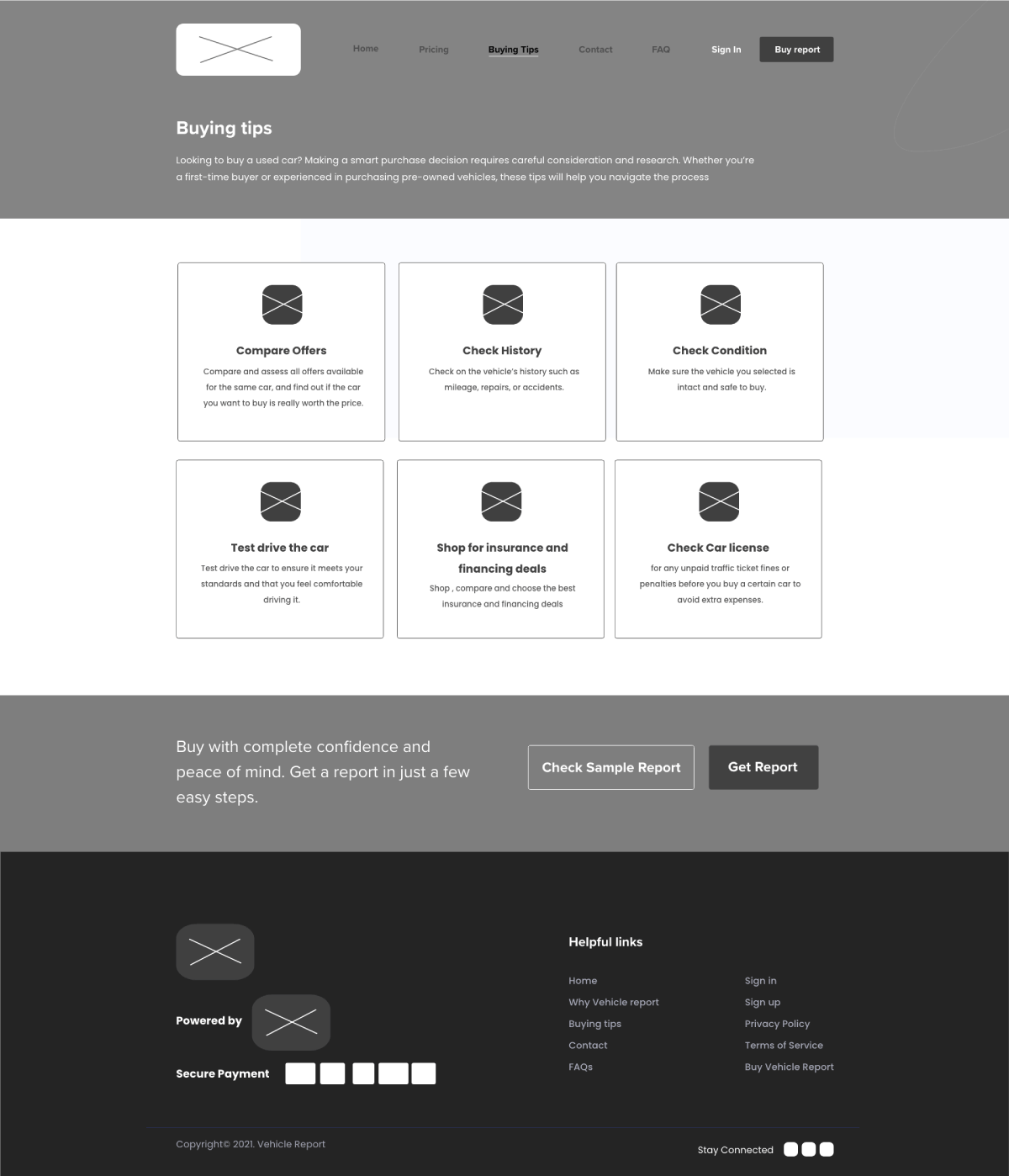


Generating and download a report

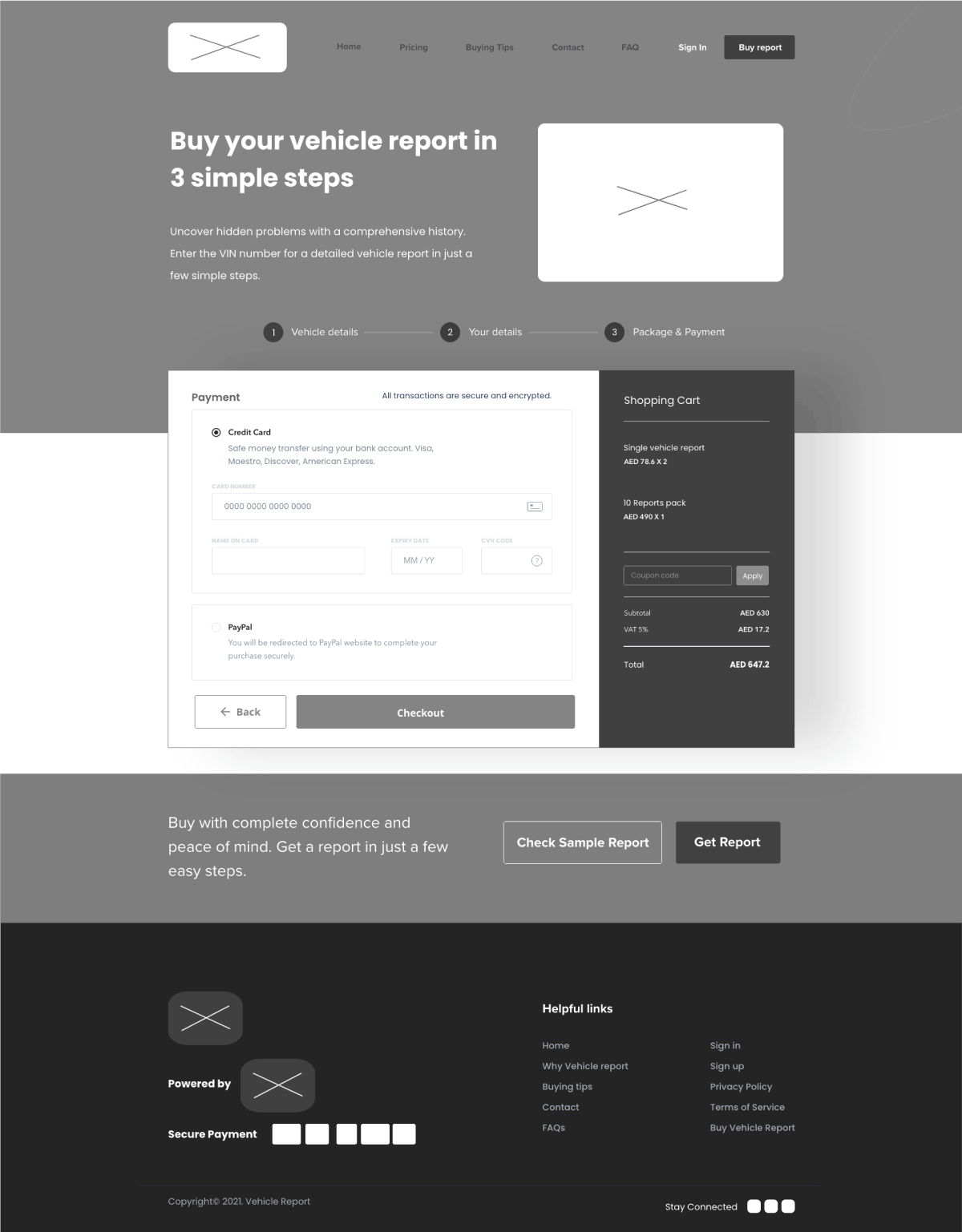
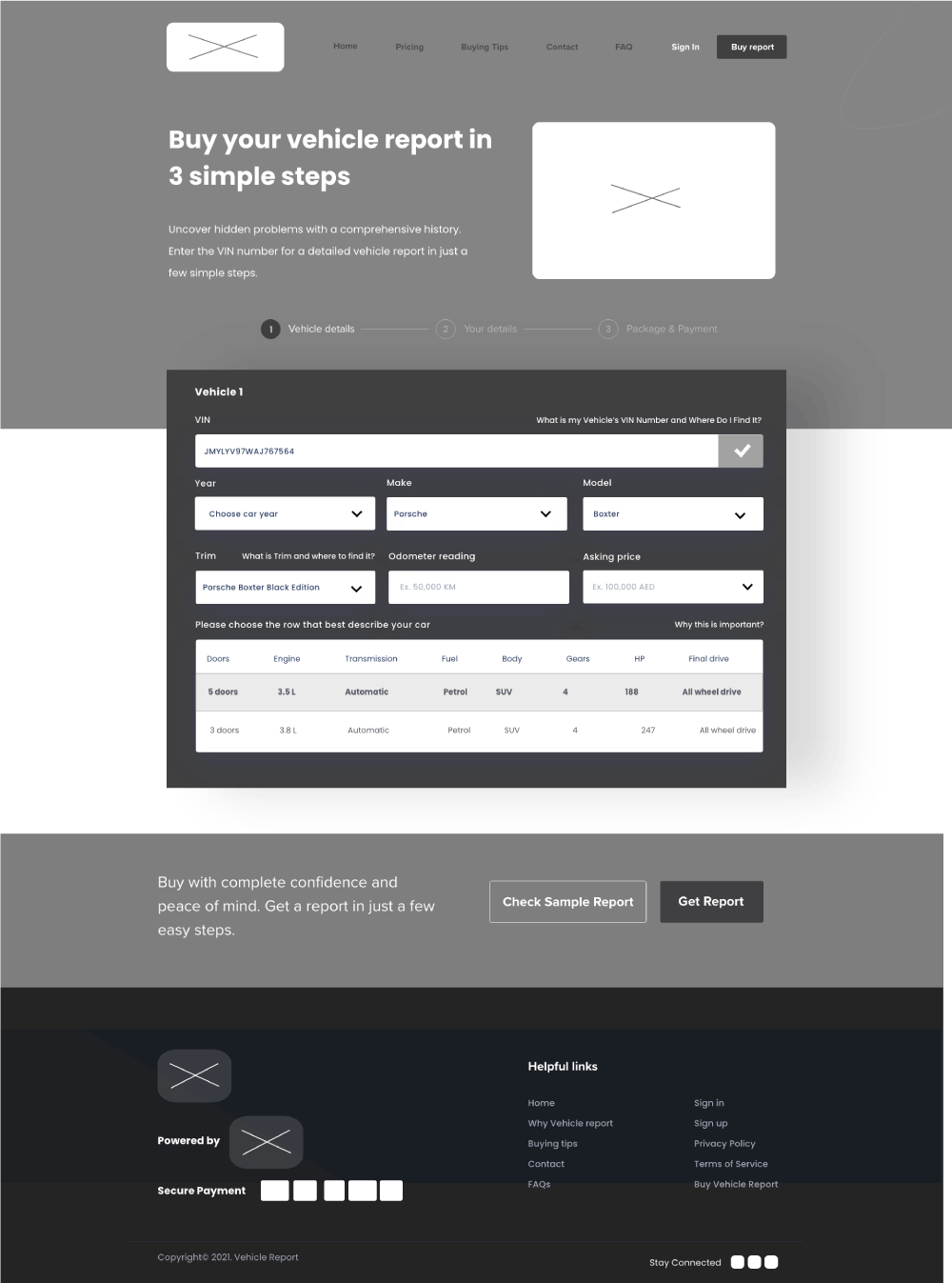




Test and Iterate
Iterated on wireframes based on user feedback
Before

Allow users to check multiple VINs simultaneously to save time and effort, especially for users who need to compare several vehicles or manage a fleet of vehicles. Instead of inputting VINs one by one, users can input multiple VINs at once and retrieve the necessary information in a single operation.
After
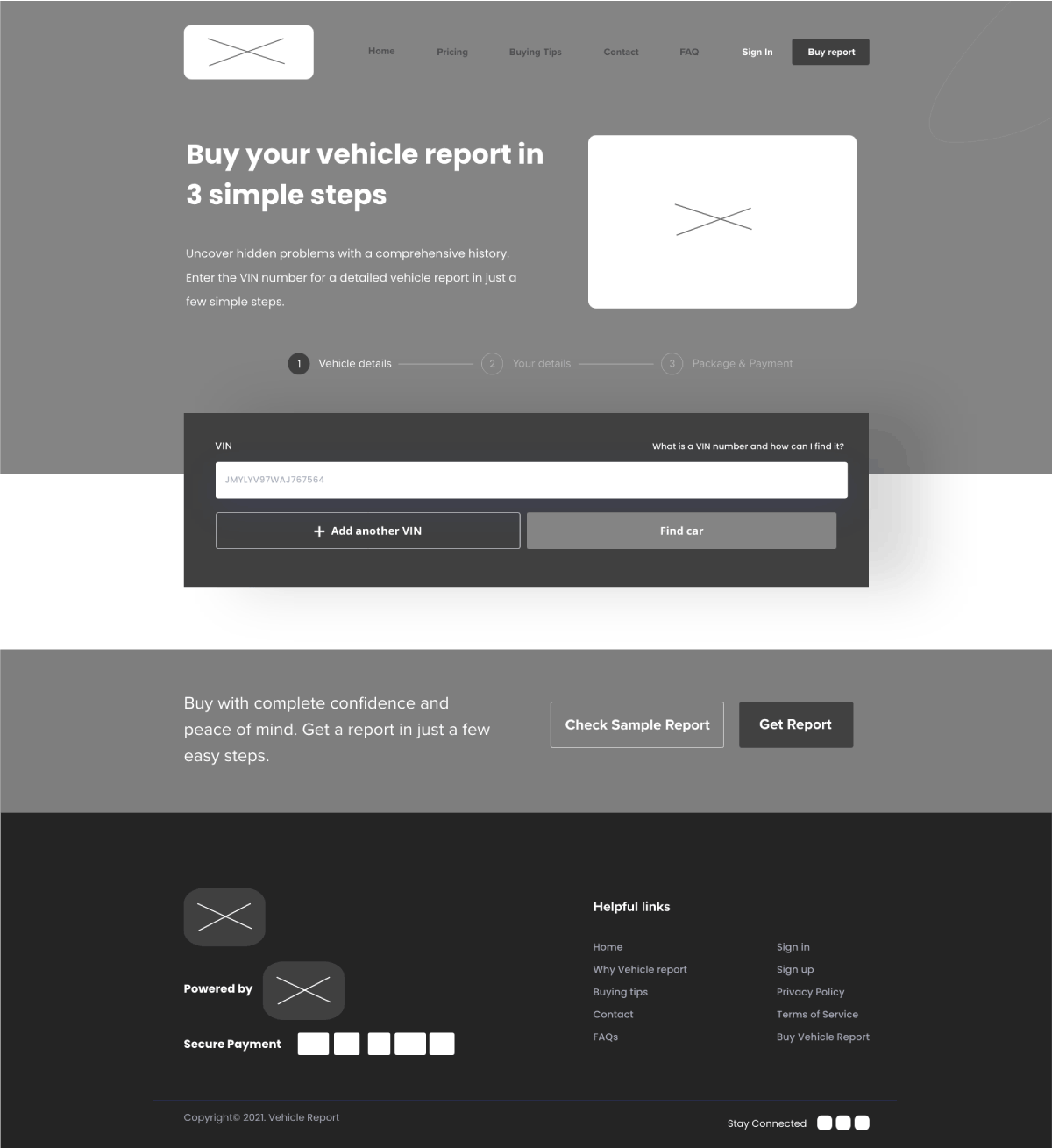

Improving clarity and transparency involves informing users about the VIN, as many may not be familiar with this concept or where to find it on a vehicle. Providing this information upfront in a modal helps educate users and reduces confusion, particularly for those new to the car-buying process or online vehicle services.


UI design and style guide
Iterated on wireframes based on feedback from mechanics, automotive professionals, and clients.
Logo design
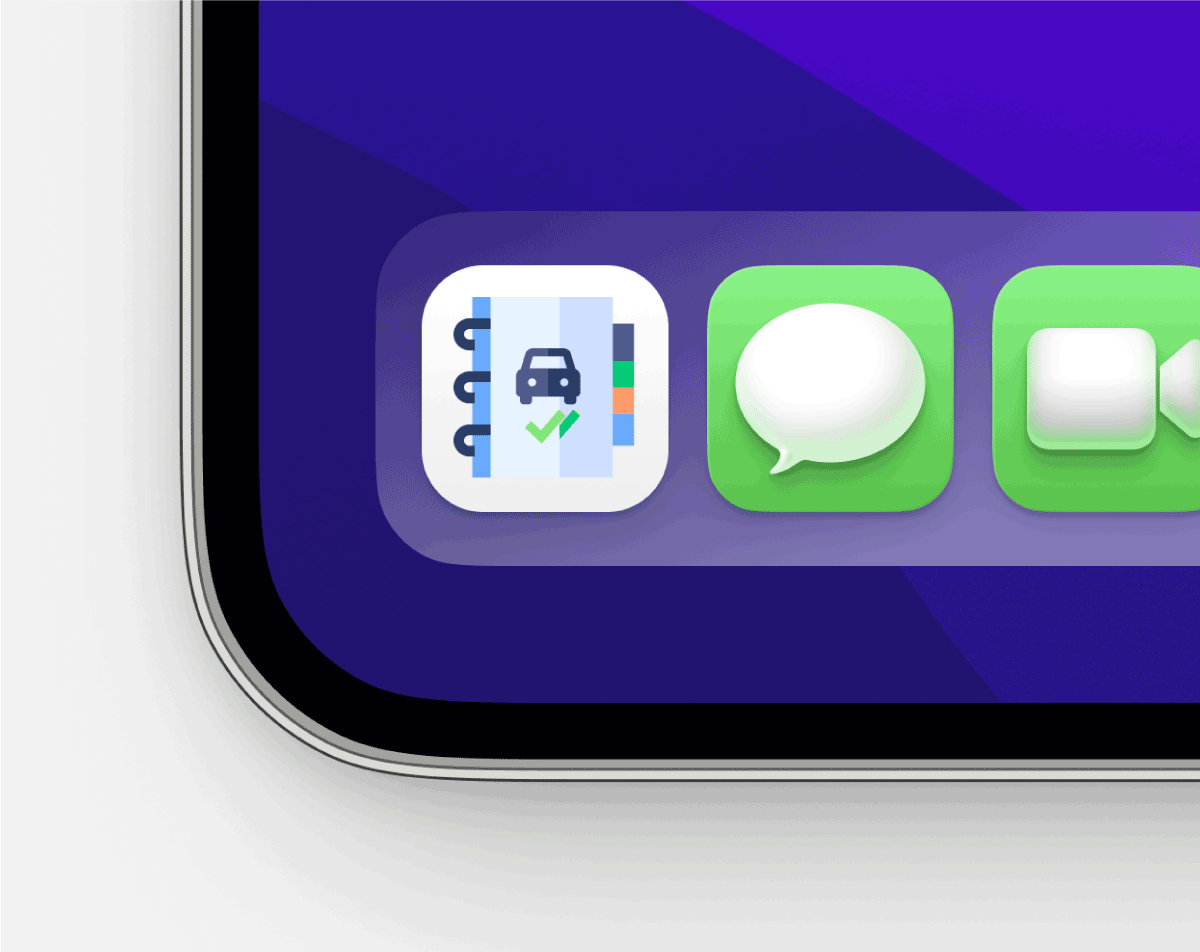


Color scheme
Applied a cohesive color scheme that enhances readability and usability across all interface elements.
#AAB0BC
#3ACF6E
#3D5D72
#293E65
#1C57C9
Typography
Choose an appropriate typography to ensure clarity and consistency throughout the platform.
Poppins
A B C D E F G H I J K L M N O P Q R S T U V W X Y Z
a b c d e f g h i j k l m n o p q r s t u v w x y z
0 1 2 3 4 5 6 7 8 9
Aa
UI elements
Incorporate interactive elements such as buttons, menus, and sliders to facilitate user engagement.
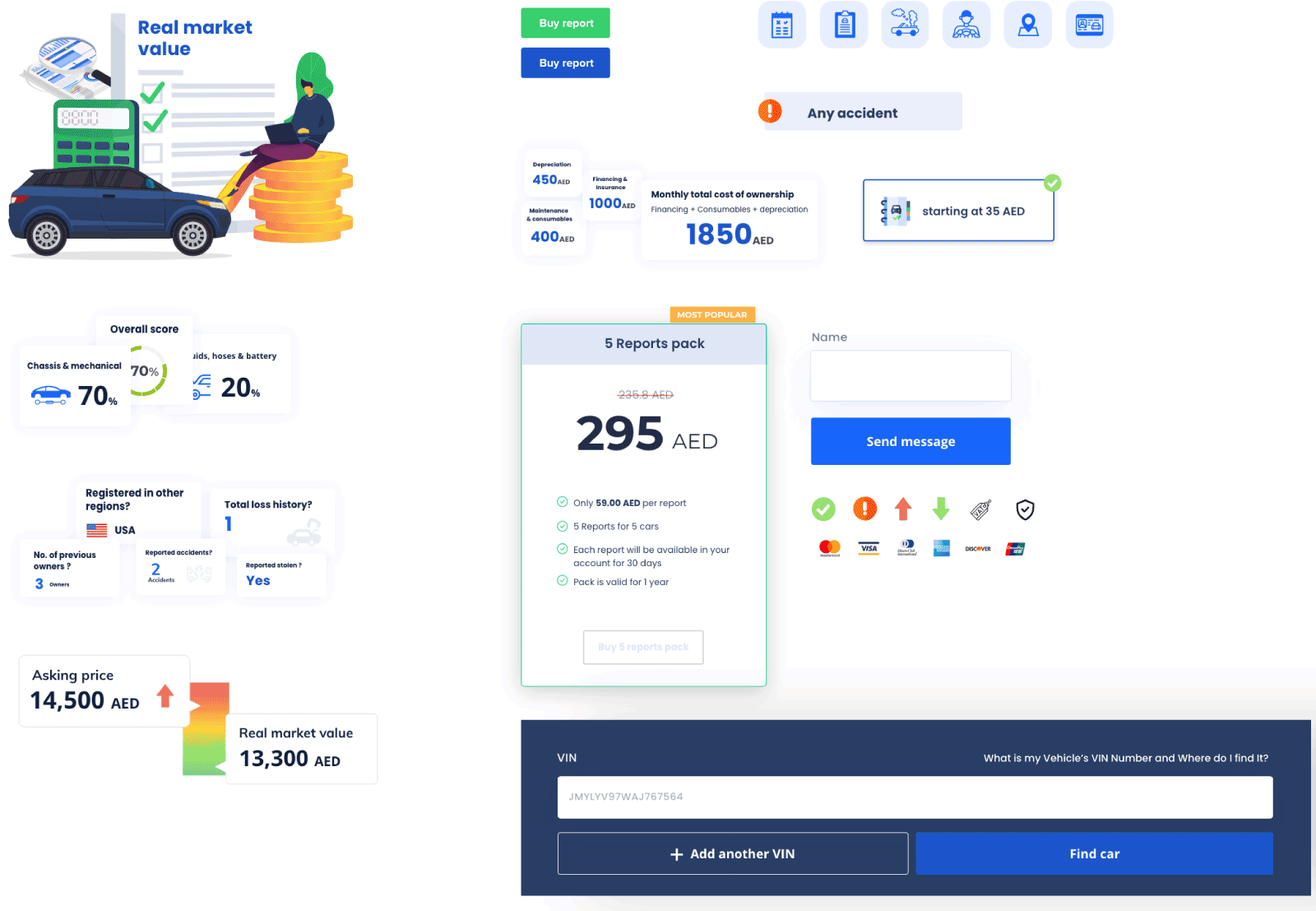
High fidelity design
Created a high-fidelity prototype with polished visual design and interactive elements to simulate the final product experience, preparing it for usability testing.

Responsive Design
Ensure the platform is responsive and adapts seamlessly to various devices (desktops, tablets, mobile phones).

Deliver Phase
In the delivery phase, the focus is on translating the finalized design concepts into a fully functional and user-friendly product. This phase involves meticulous implementation, rigorous testing, deployment, and ongoing maintenance to ensure the platform meets user needs and business objectives effectively.
04
Frontend Development
Implemented frontend components and interactions according to the design prototypes, utilizing HTML, CSS, and JavaScript frameworks such as React.js or Vue.js to create dynamic user interfaces. Collaborated closely with developers to ensure seamless integration of frontend elements with backend functionalities.
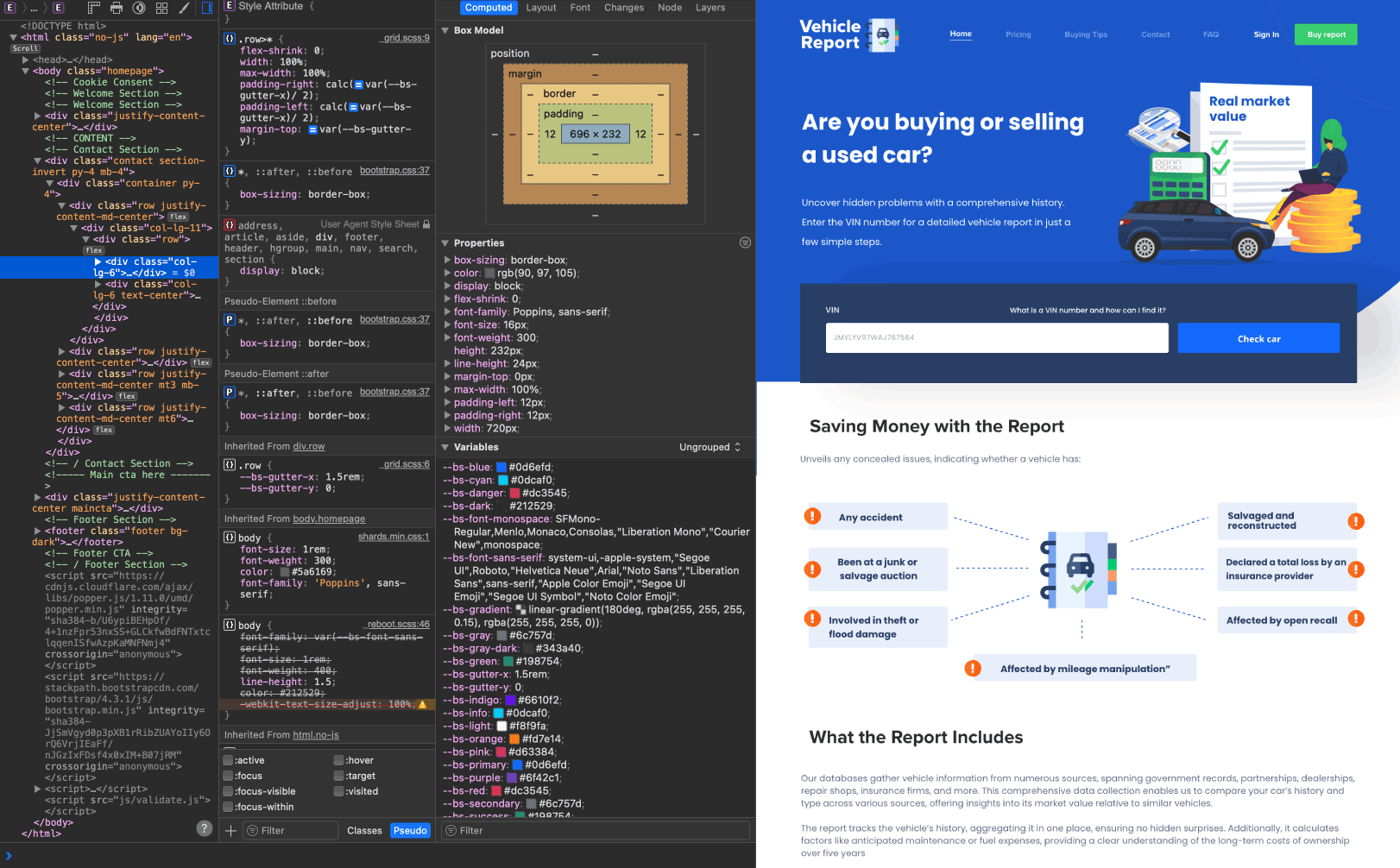
Usability Testing
Recruited test participants by identifying and involving representative users, such as car buyers and dealers, in usability testing. Developed tailored test scenarios and tasks aimed at assessing the effectiveness of key features and interactions. Conducted in-person usability testing sessions within an inspection shop setting to ensure realistic and accurate user feedback. Mechanics were asked to complete the following tasks during the testing sessions:
- Retrieve Vehicle History: Use the platform to find the complete history report of a specific vehicle identified by its VIN (Vehicle Identification Number).
- Request Valuation Estimate: Input details of a vehicle (make, model, year) and request a valuation estimate based on market trends and conditions.
- Compare Multiple Vehicles: Select and compare the specifications and valuation estimates of two or more vehicles to facilitate decision-making.
- Identify Key Information: Locate and review important information such as mileage, accident history, and ownership details within a vehicle report.
- Navigate Search Filters: Use search filters (e.g., price range, year, mileage) to refine vehicle search results and find specific types of cars.
- Save Vehicle for Later: Utilize the platform’s save feature to bookmark a vehicle of interest for future reference.
- Access Help Resources: Locate and use the platform’s help section or FAQs to find assistance in case of uncertainty or questions.
- Submit Feedback or Report Issue: Provide feedback on the usability of the platform and report any issues or areas of improvement encountered during testing.
- Verify Data Accuracy: Verify the accuracy of information presented in vehicle history reports and valuation estimates against known data.
- Use Mobile Interface: Testing on a mobile device- Navigate and interact with the platform using touch gestures and a smaller screen size.

In the usability testing sessions, users navigated the solution smoothly and completed tasks without errors or difficulties, indicating a positive user experience.
Final design
Final design
Responsive and User-Friendly Interface
A clean and intuitive interface that is easy to navigate for users of all tech-skill levels.
Focusing on Credibility and Transparency
Users can preview the report before purchasing, ensuring credibility and transparency by showing exactly what they’ll get, with the added benefit of being able to download the sample report.
Buy a report with just a few easy steps
Users can purchase reports effortlessly in a few simple steps

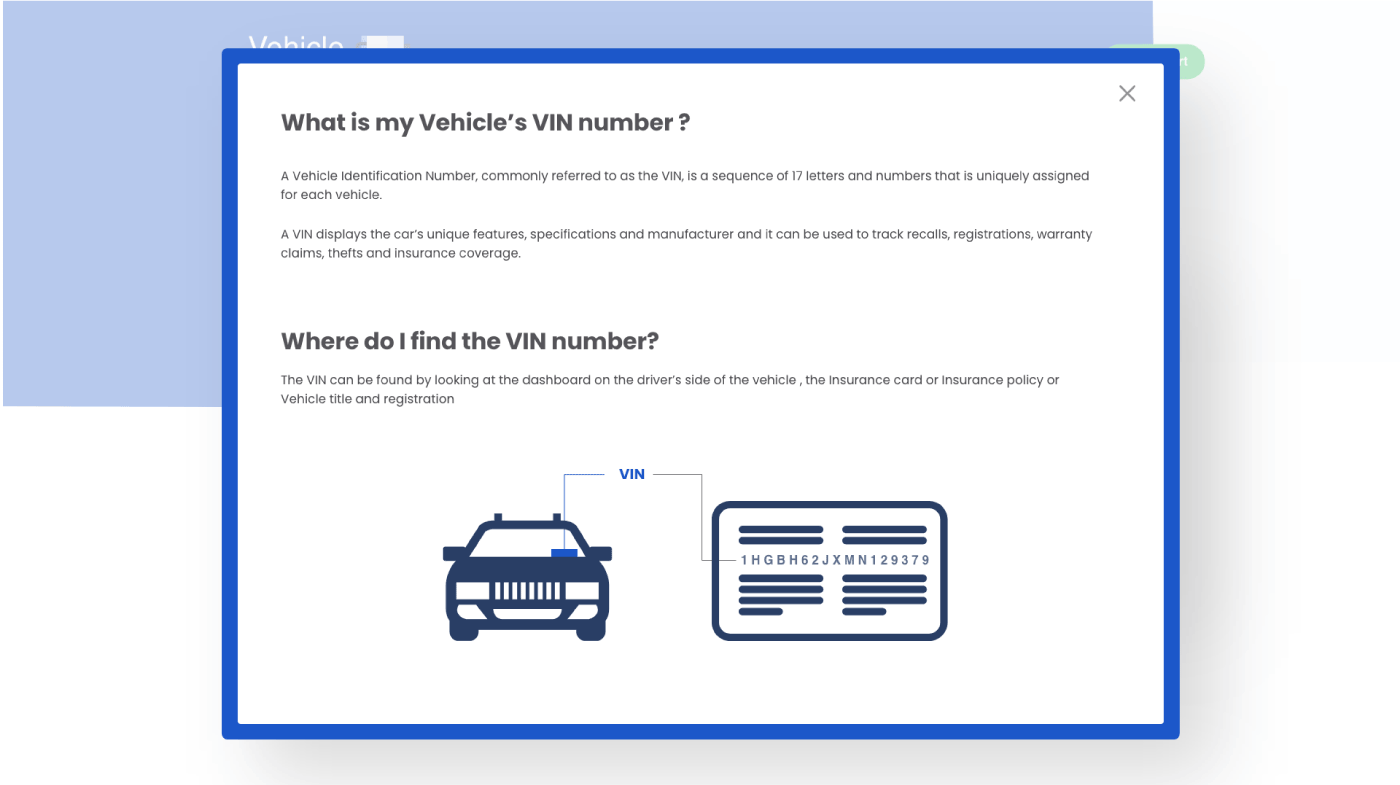




Create and update your profile easily
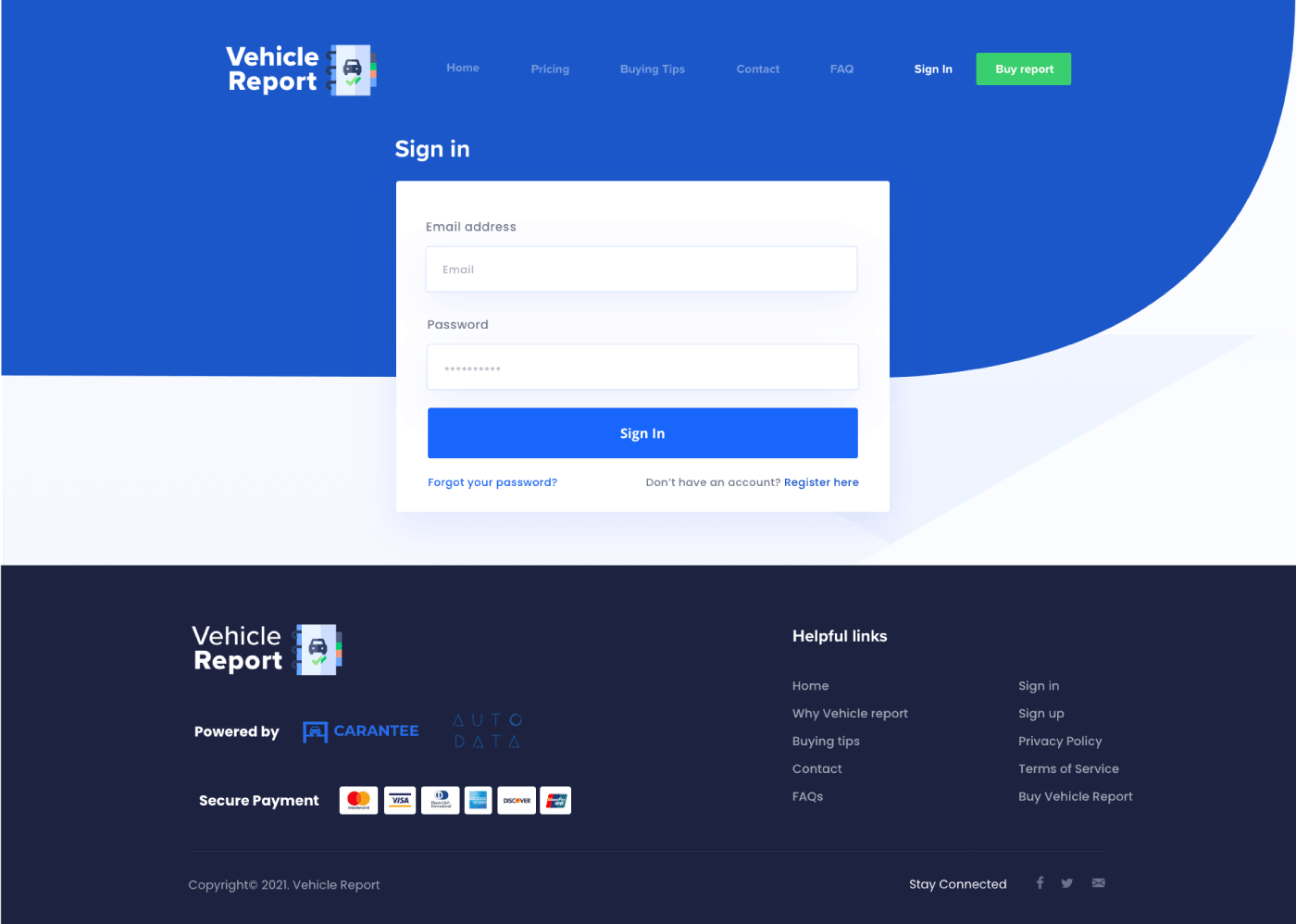




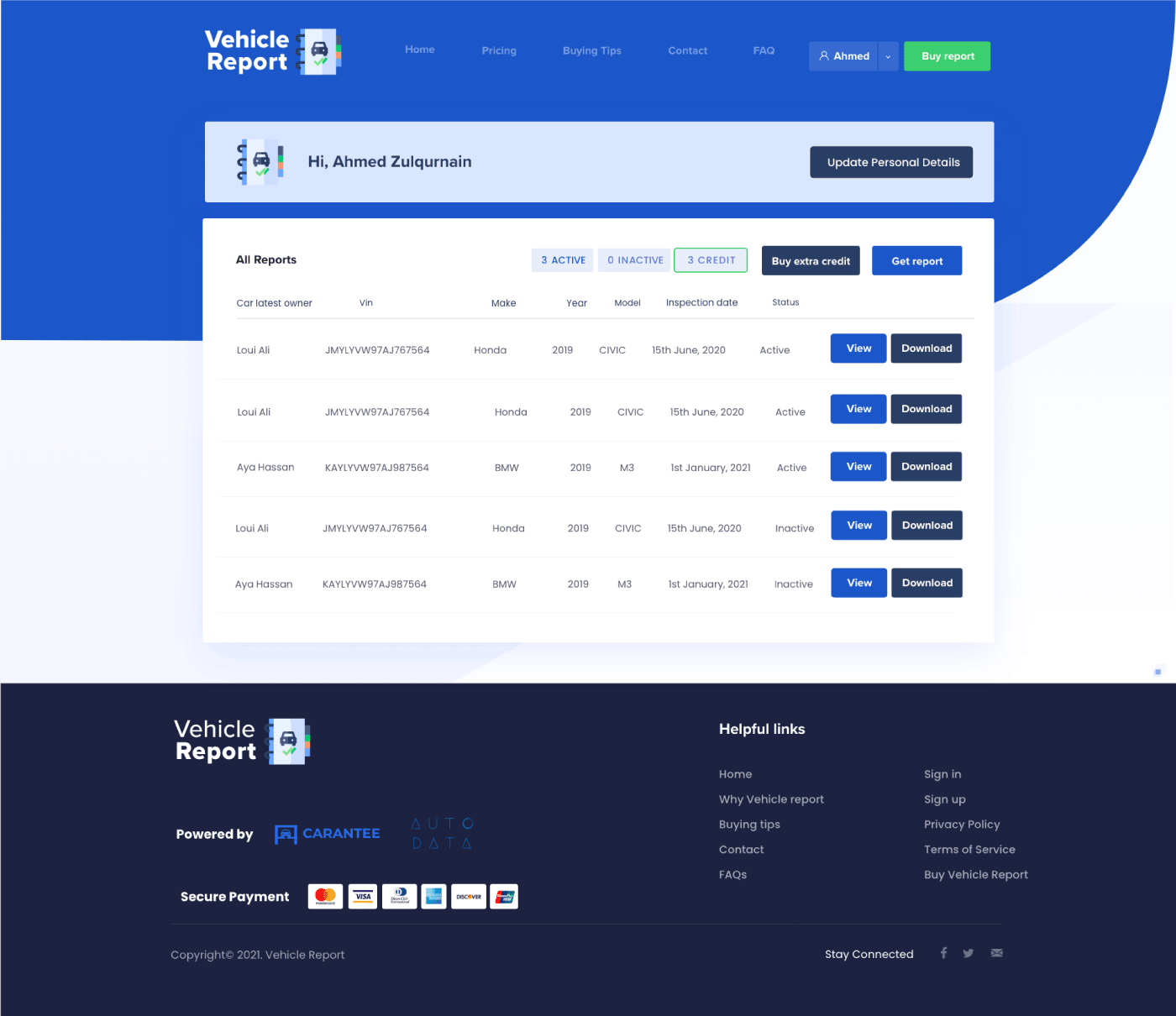
And much more..






Outcome and Impact
Vehicle Report platform successfully addresses the identified user pain points by delivering a reliable, easy-to-use solution for vehicle history and valuation. It provides a trustworthy tool for car buyers in the used car market, promoting transparency and empowering them to make informed decisions. Through rigorous testing and continuous improvement, the platform aims to ensure a seamless and satisfying experience for users throughout their car-buying journey.
Positive Feedback
Users appreciated the platform's reliability and ease of use.
High Conversion Rates
Users successfully completed purchases after using the platform.
Increased Engagement
Users spent more time on the platform exploring different car options.
If you've got a brilliant concept itching to become a reality, let's talk!
Whether you need help from initial brainstorming to prototyping and final design, I'm here to provide comprehensive product design services tailored to your vision. Let's work together to create a seamless and user-centric design solution that resonates with your audience and brings your product to its fullest potential.
Let's Talk

